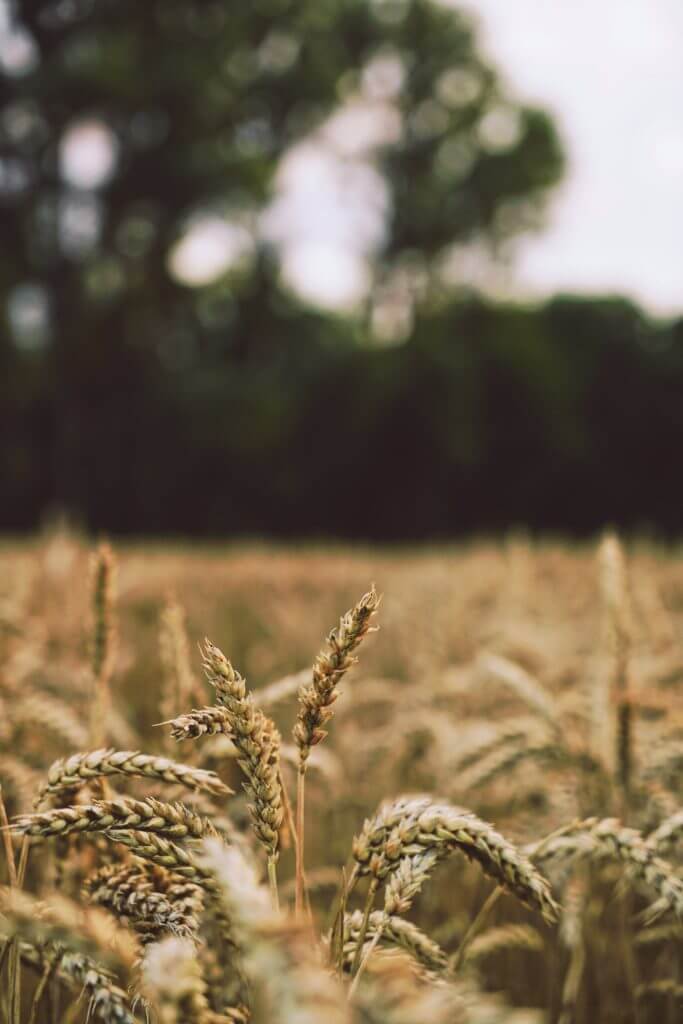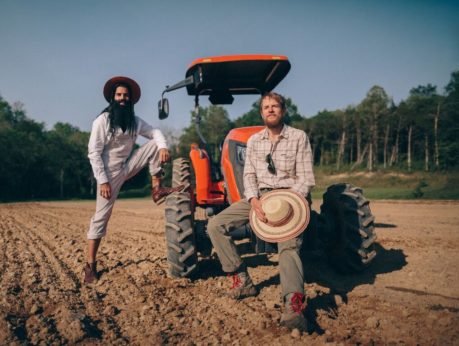Is this the fanciest farm in the world? (Probably.)
The Dutchess, in Hudson Valley is a biodynamic farm that doubles as a wellness haven.
Is this the fanciest farm in the world? (Probably.)
The Dutchess, in Hudson Valley is a biodynamic farm that doubles as a wellness haven.

the Dutchess

Dutchess County, a Hudson Valley region just north of New York City, boasts more than 675 farms over 10,000 acres of arable land. There are orchards, vineyards, fruit farms and flower farms that supply goods to community-supported agriculture, farmers’ markets and local businesses. And then, there’s the Dutchess.
Part working farm, part “secret hotel,” the Dutchess is a 236-acre biodynamic farm and inn, the vision of a stately thirtysomething named Rameet Chawla. Chawla is best known for founding a mobile app design and development firm called Fueled, which has offices from Los Angeles to London. While he may not look like a farmer, strolling through the Dutchess grounds in a matching shorts-and-button-down set, metallic sneakers shining in the sun, he is a farmer — just in his own way.
“It helps people to put other people in buckets,” he muses as we sit outside his SoHo apartment, drinking coconut water from a coconut. “It might sound weird to think about a ‘tech CEO at a biodynamic farm,’ but before, I was a ‘random finance guy in tech.’ I love to have a slightly different lens on it.”
His different lens is: How can a person use resources to solve problems that plague the world? Throughout his professional life, Chawla has held the reins of his business with one hand and helped nonprofits with the other. But after some time, Chawla felt his actions lacked impact. “That’s when the farm came into the picture,” he says.
The Dutchess isn’t just any farm. Guided by the desire to have an impact on both the local community and the neighboring metropolitan city, Chawla has created a sustainable, organic and biodynamic farm that doubles as a luxe retreat for groups, ranging from artists and chefs to corporate teams and who’s who of the city, all of whom come to unplug and reconnect with each other and nature.
Guests may wander the fields and grounds and stay in one of a variety of buildings with wood and stone façades: the stunningly renovated inn; the rustic stone house or millhouse, both of which border a rushing river; or the naturally lit guesthouse. The linens are all-natural, and Aesop soaps and dried flowers accent the rooms. There’s even a yoga barn for sound baths and meditation. There’s a skeleton of greenhouses to come, and hiking trails that lead through the gorgeous scenery. The spa offers side-by-side personal saunas that foster a sense of the communal, with massage treatments and equine therapy available as add-ons.
Beneath the surface, there is also real, tangible good being done. “We send 80 percent of what we grow at the farm to food banks to distribute to low-income families in the Poughkeepsie area,” says Chawla. “The grand vision is to have an impact on the mindset of the local metropolitan city. There are enough influential people to potentially change policy. If all the consumers start buying organic and stop buying everything else, all the industries have to move to organic, which means they have to ditch the pesticides. That means we’re helping the soil biology immediately.”
When Chawla was auditioning farmers, he met Zach Wolf, a seasoned farmer who studied science at Columbia University and ran hotelier André Balazs’s farm. As the on-site expert in biodynamic theory and practices, Wolf has been the driving force behind the Dutchess’s initiatives.
Biodynamics began in the 1920s, when Dr. Rudolf Steiner, of Waldorf school fame, gave lectures that covered the health of the land, touching on the ravages of industrialization and urging a return to more agrarian ways. Demeter International, the nonprofit organization that certifies biodynamic farms, states on its website that its mission is to heal the planet through agriculture. One of the stark differences between organic and biodynamic certification is that, while hydroponic farms (which grow food in water) can obtain organic status, biodynamic-certified agriculture must be based in soil.
Wolf finds the philosophical approach to biodynamic farming beautiful. “The land at the Dutchess has been transforming for millions of years,” he says. “The soil is tens of thousands of years old. For thousands of years, people have been living here. Part of the strategy of biodynamic farming is to recognize that the farm has its own individuality. To allow this to come to fruition is to spend time in that place and understand its facets.” According to Wolf, this may include soil tests, geology, hydrology and other ways to analytically understand the landscape and how to augment — instead of deplete — the soil with nutrients.
“What we do today will determine the future of humanity,” says Wolf. “The Dutchess gives people a physical space to viscerally feel held and safe and be introduced to ideas that they haven’t been introduced to before. But the farm is only as able and vital as its social connections.”
Wolf works with internal nutrient cycles and speaks of building composting operations and eventually integrating livestock to become a self-sufficient and biodynamic farm (the Dutchess is not yet certified organic). His goal is to generate as much fertility from the farm as possible. “There’s a spiritual beingness to it,” he says. “The farm allows divinity to present itself through the act of farming, food and nourishment.”
The remaining 20 percent of food that doesn’t go to food banks is used to create farm-to-table meals in Pop’s Kitchen. While Chawla is frequently approached for wholesale opportunities, he rejects most offers, opting to serve the produce on-site as a hook: Why do these potatoes taste so damn good? Chawla is careful to keep the Dutchess a “secret hotel.” And, try as you might to check in, you can’t — unless you’re going with a retreat group or invited by the founder.
“My goal isn’t popularity,” says Chawla. “My goal is impact.” He recounts taking a friend to meet Zach — it was her first time pulling carrots out of the ground. Chawla watched her face and told Zach, “That’s what I want to give people.”
Follow us
This work is licensed under a Creative Commons Attribution-NoDerivatives 4.0 International License.
Want to republish a Modern Farmer story?
We are happy for Modern Farmer stories to be shared, and encourage you to republish our articles for your audience. When doing so, we ask that you follow these guidelines:
Please credit us and our writers
For the author byline, please use “Author Name, Modern Farmer.” At the top of our stories, if on the web, please include this text and link: “This story was originally published by Modern Farmer.”
Please make sure to include a link back to either our home page or the article URL.
At the bottom of the story, please include the following text:
“Modern Farmer is a nonprofit initiative dedicated to raising awareness and catalyzing action at the intersection of food, agriculture, and society. Read more at <link>Modern Farmer</link>.”
Use our widget
We’d like to be able to track our stories, so we ask that if you republish our content, you do so using our widget (located on the left hand side of the article). The HTML code has a built-in tracker that tells us the data and domain where the story was published, as well as view counts.
Check the image requirements
It’s your responsibility to confirm you're licensed to republish images in our articles. Some images, such as those from commercial providers, don't allow their images to be republished without permission or payment. Copyright terms are generally listed in the image caption and attribution. You are welcome to omit our images or substitute with your own. Charts and interactive graphics follow the same rules.
Don’t change too much. Or, ask us first.
Articles must be republished in their entirety. It’s okay to change references to time (“today” to “yesterday”) or location (“Iowa City, IA” to “here”). But please keep everything else the same.
If you feel strongly that a more material edit needs to be made, get in touch with us at [email protected]. We’re happy to discuss it with the original author, but we must have prior approval for changes before publication.
Special cases
Extracts. You may run the first few lines or paragraphs of the article and then say: “Read the full article at Modern Farmer” with a link back to the original article.
Quotes. You may quote authors provided you include a link back to the article URL.
Translations. These require writer approval. To inquire about translation of a Modern Farmer article, contact us at [email protected]
Signed consent / copyright release forms. These are not required, provided you are following these guidelines.
Print. Articles can be republished in print under these same rules, with the exception that you do not need to include the links.
Tag us
When sharing the story on social media, please tag us using the following: - Twitter (@ModFarm) - Facebook (@ModernFarmerMedia) - Instagram (@modfarm)
Use our content respectfully
Modern Farmer is a nonprofit and as such we share our content for free and in good faith in order to reach new audiences. Respectfully,
No selling ads against our stories. It’s okay to put our stories on pages with ads.
Don’t republish our material wholesale, or automatically; you need to select stories to be republished individually.
You have no rights to sell, license, syndicate, or otherwise represent yourself as the authorized owner of our material to any third parties. This means that you cannot actively publish or submit our work for syndication to third party platforms or apps like Apple News or Google News. We understand that publishers cannot fully control when certain third parties automatically summarize or crawl content from publishers’ own sites.
Keep in touch
We want to hear from you if you love Modern Farmer content, have a collaboration idea, or anything else to share. As a nonprofit outlet, we work in service of our community and are always open to comments, feedback, and ideas. Contact us at [email protected].by Niree Noel, Modern Farmer
November 12, 2018
Modern Farmer Weekly
Solutions Hub
Innovations, ideas and inspiration. Actionable solutions for a resilient food system.
ExploreExplore other topics
Share With Us
We want to hear from Modern Farmer readers who have thoughtful commentary, actionable solutions, or helpful ideas to share.
SubmitNecessary cookies are absolutely essential for the website to function properly. This category only includes cookies that ensures basic functionalities and security features of the website. These cookies do not store any personal information.
Any cookies that may not be particularly necessary for the website to function and are used specifically to collect user personal data via analytics, ads, other embedded contents are termed as non-necessary cookies.
Sounds similar to a healing retreat source, of my dreams, to create.
Friends of ours had confirmed reservations to stay at the Dutchess 3/15-17. A week ahead of time their reservation was cancelled because the property got a better offer from a corporation. My friends were offered the opportunity to stay at the owners home if they brought their own groceries.
Not good karma.